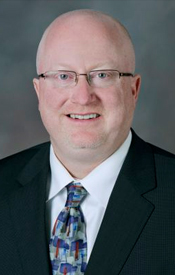
ASHP is speaking with members of the PICS advisory panel as part of a series of podcasts and stories about their professional journeys. This story focuses on Joe Ness at OHSU Healthcare.

Growing up in Washington state, Joe Ness found his professional role model early in life: A family friend who was a pharmacist and everyone’s “go-to guy.”
“He was both a businessman and a clinical, patient-care type person,” recalled Ness. “And so that got me interested.”
Ness worked as a health-system pharmacist before moving into hospital leadership roles nearly 33 years ago. Today he is a senior vice president and chief operating officer at OHSU Healthcare in Oregon and serves on the advisory panel for ASHP’s Pharmacy in C-Suites (PICS).
He had no pre-determined roadmap, but as a PICS advisory committee member, Ness says he hopes to show other pharmacists they are developing skills that can also take them to the C-suite. “Compared to other professional services, pharmacy is just miles ahead in terms of preparing people for leadership roles,” he said.
What follows is an edited transcript of an interview with Ness.
How did you get started in leadership positions?
I took my first jobs in the hospital pharmacy world and then kept quickly getting tapped to take on more leadership roles. So even when I was pharmacy manager, I was also the manager of oncology infusion, for example. My career kept expanding that way. I remember turning down an offer and saying, “I’m not done with my pharmacy career yet.” I remember trying to negotiate and saying, “Well, can my title be vice president of pharmacy and professional services?” I didn’t want to lose my pharmacy identity.
Do you think other pharmacists sometimes are reluctant to give up that part of their identity?
Absolutely. It’s a hard transition. Every hospital and health system structures those executive jobs differently. So having a natural home for peer networking is challenging.
What was the hardest part of the transition?
I remember having to be careful to not say to people who report to me, "Well you should do things like pharmacy does." I had to be careful and pay extra time and attention to understanding their worlds and how they differ from the pharmacy world.
Why might pharmacists have transferrable skills to these executive positions?
I think it’s in part due to the fact that the pharmacist deals with such a variety of issues. They’re dealing with patient care and education, and they are interfacing with physicians, nurses and all the clinicians. They are cost conscious, and they are dealing with billing and prior authorization — the same issues I as an executive have to be aware of.
What’s the most pressing healthcare issue to emerge in the last five to 10 years? Anything you never saw coming?
The biggest, of course, was the Covid-19 pandemic. While it was a unique and challenging time, I saw the pharmacy team really come together in a leadership role to meet the many challenges of caring for patients and delivery of the vaccinations. But I think the most pressing challenge that emerged and I never saw coming was the degree to which healthcare staff left the industry following the pandemic. While working in healthcare can be very rewarding personally and professionally, it has really punctuated the point that these jobs are very hard.
What continues to surprise you in this position?
After 33 years, I have recognized a sort of Groundhog Day feature of the hospital world and healthcare in general. Things do kind of cycle around and you say, “Wow. We’ve been there and done that before.”
Like what?
One of the things that stands out the most is the cyclical nature of finances. We’re back again in this profitless growth mode. This is exactly what we experienced before, where we’re busting at the seams, at full capacity, surgery is humming along, medical floors are overcapacity, and yet the reimbursement necessary to generate working capital is a struggle.
What advice would you give to a pharmacist aspiring to these executive positions?
Love what you are doing today and do a great job at it. That is what gets the attention of others who might see you have the skills and abilities to do more at a different level. And take on cross-departmental projects. Build those skills and showcase your ability to work with people outside pharmacy.
Check back for more stories in this series and for our first Pharmacists in the C-Suite podcast, a conversation with hospital executives Montez Carter, Ruth Cassidy, and Mike Sanborn.








